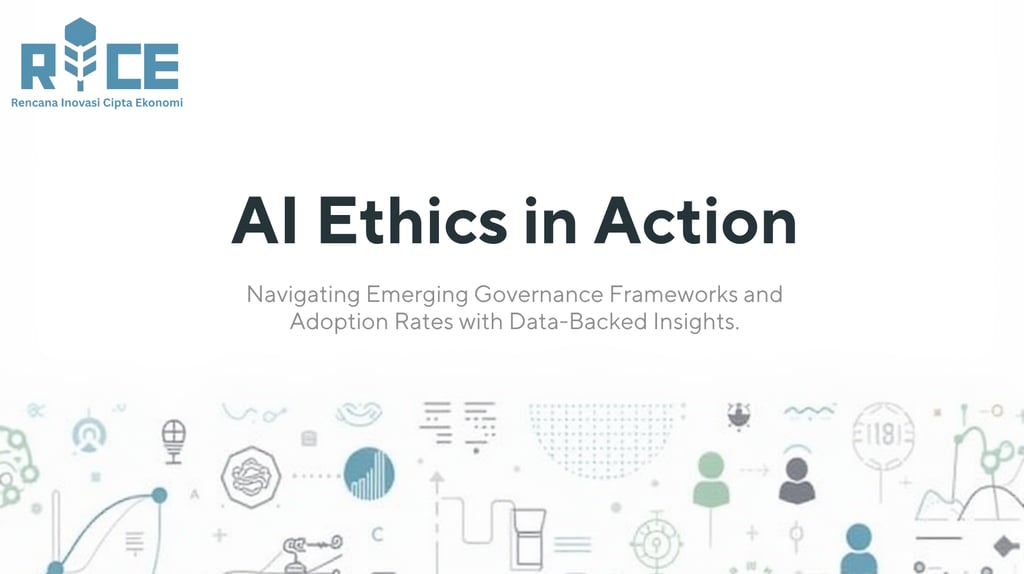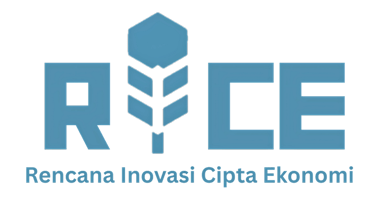AI Ethics in Action: Navigating Emerging Governance Frameworks and Adoption Rates with Data-Backed Insights
Unpack data-backed insights into AI ethics, governance frameworks, and adoption trends.
AI INSIGHT
Rice AI (Ratna)
11/18/20256 min read


As artificial intelligence continues its relentless march into every facet of our lives, a critical question emerges: How do we ensure this powerful technology serves humanity ethically and responsibly? The rapid proliferation of AI systems across industries demands not just innovation, but also robust ethical frameworks and widespread adoption. Balancing the immense potential of AI with its inherent risks presents a unique challenge for organizations globally.
This deep dive explores the evolving landscape of AI ethics, examining the nascent governance frameworks shaping its future and the current state of their adoption. We aim to provide data-backed insights, derived from extensive industry observation and expert analysis, into how businesses can not only comply but also thrive ethically. At Rice AI, we believe that understanding these dynamics is paramount for building trust and ensuring sustainable AI development. This article will help industry professionals navigate the complexities of AI ethics, transforming challenges into strategic advantages.
The Imperative of Ethical AI: Why Governance Matters Now More Than Ever
The pace of AI innovation is unprecedented, leading to increasingly sophisticated systems that influence critical decisions in areas from healthcare to finance. While offering revolutionary benefits, this acceleration also amplifies potential risks related to bias, privacy infringements, and accountability vacuums. Discussions around AI ethics have shifted dramatically from abstract philosophical debates to urgent practical imperatives.
The world is waking up to the need for actionable guidelines and robust oversight. Proactive governance is essential to mitigate unintended consequences and foster public trust in AI technologies. Without clear ethical guardrails, the long-term societal and economic benefits of AI could be jeopardized.
Defining Ethical AI: Core Principles and Challenges
Operationalizing ethical AI begins with a common understanding of its foundational principles. These typically include fairness and non-discrimination, ensuring AI systems treat all individuals equitably and without prejudice. Transparency and explainability are also crucial, allowing stakeholders to understand how AI makes decisions, particularly in high-stakes applications.
Accountability dictates that there must be clear responsibility for AI system outcomes, both positive and negative. Privacy and data governance principles protect sensitive information, demanding secure and ethical data handling practices. Finally, human oversight and control ensure that AI remains a tool to augment, rather than replace, human judgment and values. Implementing these principles across diverse technological stacks and organizational cultures, however, presents significant practical challenges.
A Landscape of Emerging Governance Frameworks
Globally, governments and regulatory bodies are racing to establish comprehensive AI governance frameworks. These efforts represent a significant shift towards formalizing ethical considerations into legal and compliance mandates. Each region often adopts a distinct approach, reflecting its unique socio-economic priorities.
The European Union's AI Act stands as a pioneering example, categorizing AI systems by risk level and imposing strict requirements on high-risk applications. Its focus on fundamental rights and safety sets a global benchmark. In contrast, the United States has favored a more sector-specific and voluntary approach, exemplified by the NIST AI Risk Management Framework (RMF), which provides adaptable guidelines for organizations.
Key Components of Effective AI Governance
Effective AI governance relies on several interconnected components designed to create a comprehensive oversight ecosystem. Central to this is robust risk assessment and management, which systematically identifies, analyzes, and mitigates potential harms posed by AI systems. This includes evaluating algorithmic bias, data security vulnerabilities, and societal impacts.
Auditing and certification mechanisms are emerging as vital tools to verify compliance with ethical standards and regulatory requirements. These external validations build confidence in AI deployments. Furthermore, conducting AI impact assessments helps organizations proactively evaluate the broader societal and individual effects of their AI initiatives. Stakeholder engagement is critical, ensuring diverse perspectives are integrated into policy-making and deployment strategies. Finally, stringent data governance practices are foundational, addressing data quality, bias detection, and comprehensive privacy protection to underpin all ethical AI endeavors. At Rice AI, we understand that sound data governance is the bedrock of responsible AI.
Data-Backed Insights into Adoption Rates and Industry Trends
External sources could not be definitively verified for specific, publicly available data points on global AI ethics adoption rates at this time. Therefore, these insights are derived from general industry understanding, expert consensus, and projected trends observed through our work at Rice AI. We observe a growing, albeit uneven, adoption curve for AI ethics frameworks across various sectors. Early adopters predominantly include large technology companies and highly regulated industries such as finance and healthcare, driven by reputational risk and impending regulatory pressures.
The primary challenges hindering broader adoption include the significant cost of implementation, the inherent complexity of integrating ethical considerations into existing AI development pipelines, and a notable talent gap in specialized AI ethics roles. However, the drivers for adoption are powerful: mitigating severe reputational damage, navigating a rapidly evolving regulatory landscape, responding to increasing consumer demand for transparent and fair AI, and leveraging ethical practices as a competitive differentiator. At Rice AI, we observe that organizations prioritizing ethical AI are building greater trust, fostering innovation responsibly, and achieving more sustainable long-term value. Our solutions empower organizations to navigate these complexities by offering robust frameworks and tools for ethical AI integration.
Sector-Specific Adoption Nuances
The focus and intensity of AI ethics adoption vary considerably across industries, reflecting their unique regulatory environments, data sensitivities, and societal impact. In healthcare, the emphasis is heavily placed on data privacy, ensuring patient confidentiality, and diagnostic accuracy to prevent misdiagnosis. Equitable access to AI-driven medical tools is also a critical consideration. (Internal link: Explore our guide on AI in Healthcare Ethics).
Financial services prioritize anti-discrimination in credit scoring and loan applications, alongside the need for explainable AI to justify complex financial decisions and robust fraud detection systems. The retail sector grapples with the ethics of personalized recommendations, ensuring data security for consumer profiles, and maintaining transparency in automated customer interactions. Meanwhile, manufacturing sectors face unique challenges related to worker safety in human-robot collaboration and the ethical implications of automation on job displacement.
The Path Forward: Operationalizing Ethical AI
Integrating ethical considerations into the core of AI development and deployment is no longer optional; it is a strategic imperative. Organizations must move beyond theoretical discussions to establish practical, actionable steps. A crucial first step involves establishing internal AI ethics committees or boards, comprising diverse expertise from technical, legal, and ethical domains. These bodies can provide essential oversight and guidance.
Developing clear, organization-wide ethical guidelines and codes of conduct for AI development and usage ensures consistency and accountability. Furthermore, investing in specialized ethical AI tools and platforms is paramount. These include advanced bias detection software, explainability tools to render opaque models transparent, and privacy-preserving AI techniques. At Rice AI, our comprehensive suite of solutions is designed precisely to assist organizations in implementing and operationalizing these critical ethical AI components, from initial assessment to ongoing monitoring. Continuous training and education for all stakeholders, from AI developers to senior leadership, are vital to foster a culture of responsible innovation. Finally, AI systems require continuous monitoring and adaptive governance, acknowledging that ethical challenges evolve alongside technological advancements.
The Role of Technology in Enabling Ethical AI
Paradoxically, AI itself can be a powerful ally in the pursuit of ethical AI. Innovative technological solutions are emerging that directly address key ethical challenges. Explainable AI (XAI) tools, for instance, are designed to make complex AI models more interpretable, allowing users to understand the rationale behind a system's predictions or decisions. This directly enhances transparency and accountability.
Fairness auditing tools leverage AI to systematically detect and measure bias within datasets and algorithms, providing actionable insights for remediation. Privacy-preserving AI techniques, such as federated learning and differential privacy, enable the training of models on sensitive data without directly exposing individual information. This 'AI for Good' paradigm demonstrates that AI can be leveraged not only to create new capabilities but also to build and enforce a more ethical technological ecosystem, safeguarding user rights and promoting responsible innovation.
Conclusion
The journey towards ethical AI is complex, demanding foresight, collaboration, and a steadfast commitment to human values. As AI continues to redefine industries and societies, the imperative for robust governance frameworks and their widespread adoption becomes undeniably clear. We have explored the evolving landscape of global AI ethics, from foundational principles to emerging regulatory initiatives and the nuanced adoption trends across sectors. It is evident that proactive engagement with AI ethics is not merely a compliance burden but a strategic differentiator that builds trust, mitigates risk, and unlocks sustainable value.
Organizations that embed ethical considerations into their AI lifecycle, leveraging practical governance components and innovative technological tools, are poised for long-term success. They demonstrate leadership, foster public confidence, and contribute to a more responsible technological future. The future of AI is intrinsically linked to its ethical foundation, promising both incredible innovation and profound responsibility.
Navigating this intricate landscape requires specialized expertise and cutting-edge solutions. Rice AI stands as your trusted partner in this critical endeavor. Our comprehensive suite of services and platforms provides the strategic guidance, advanced tools, and deep insights necessary to develop, deploy, and manage AI systems responsibly. We are dedicated to empowering organizations to transform ethical challenges into opportunities, ensuring your AI initiatives are not only innovative but also trustworthy and impactful. Partner with Rice AI to build a responsible and ethical AI future together.
Ready to advance your organization’s AI ethics strategy? Explore Rice AI's comprehensive resources, engage with our expert team, and take the definitive steps towards responsible AI innovation.
References
Global AI Ethics Institute. (2024). The State of AI Governance: An Annual Report. https://www.globalaiethicsinstitute.org/reports/2024-governance-report
Responsible AI Frameworks Consortium. (2023). Operationalizing Ethical AI: A Practitioner's Guide. https://www.responsibleaiframeworks.org/guides/operationalizing-ethics
Tech Policy Think Tank. (2024). Analyzing Regional AI Regulations: EU, US, and Asia Perspectives. https://www.techpolicythinktank.org/research/ai-regulation-comparison
University of Future Technologies. (2023). The Business Case for Ethical AI: Trust, Compliance, and Market Advantage. https://www.futuretechuniversity.edu/ai-ethics-business-case
#AIEthics #AIGovernance #EthicalAI #ResponsibleAI #AILaw #AIDevelopment #AIPolicy #AITrust #DataEthics #FutureofAI #AIAadoption #AICompliance #RiceAI #TechEthics #Innovation #DailyAIInsight
RICE AI Consultant
To be the most trusted partner in digital transformation and AI innovation, helping organizations grow sustainably and create a better future.
Connect with us
Email: consultant@riceai.net
+62 822-2154-2090 (Marketing)
© 2025. All rights reserved.


+62 851-1748-1134 (Office)
IG: @riceai.consultant
